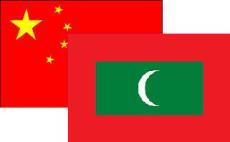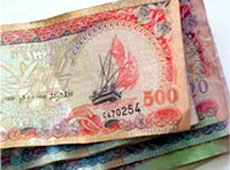Religious conservative Adhaalath Party leader Sheikh Imran Abdulla has accused Maldivian Democratic Party (MDP) presidential candidate and former President Mohamed Nasheed of using black magic to garner support for the party.
“As a result of bringing in people from India, Sri Lanka, and various parts of the Maldives to perform black magic for [Nasheed], and then casting spells on food and feeding them to the masses, Nasheed has caused large numbers of people to become blind towards all his wrongdoings, and to imagine characteristics of being democratic and pro-development in him, and to be deluded into thinking they are in absolute support of him while in reality they are in a crazed state of enchantment and therefore run behind him,” Imran said, addressing the Jumhoree Coalition’s first major rally in the capital.
“Nasheed’s followers are anti-Islamic people like him and huge criminals. The rest are people under the influence of his black magic. Most people are bewitched and under black magic spells. This is the state of this country,” he said.
“Nasheed is doubtless an agent – one who has been rather well trained – sent in by enemies of Islam and our nationalism,” Imran continued. “A vote cast for Nasheed is an act which will facilitate the eradication of Islam from this country and will hurl us into a state of slavery.”
He furthermore alleged that during Nasheed’s time as President, he had “forced alcohol down the throats of Maldivians”, erased Islam, sold national assets and gave the profits to his “cronies”, and had himself “hidden away in his pockets US$16 million by giving away the airport to GMR”.
 Moving away from his religion-based rhetoric, Sheikh Imran then spoke of Chinese superstitions as his justification of why people should not vote for Nasheed.
Moving away from his religion-based rhetoric, Sheikh Imran then spoke of Chinese superstitions as his justification of why people should not vote for Nasheed.
“In matters involving luck, the Chinese would never opt for number four,” he stated.
“If Nasheed approaches the 1 billion people of China as Candidate Number Four and asks for their vote, he will not be able to get a single vote,” he said.
Imran also spoke of how Nasheed is “spending billions on his campaign while he does not own any major assets or businesses in the country”. Imran then accused Nasheed of accepting funding for his campaigns from “foreign churches aiming to spread anti-Islam propaganda”.
Towards the end of his speech, Imran admitted that he “tends to levy a lot of criticism against Nasheed”, and said that this was not due to any personal grudges against the candidate.
“I have to speak against Nasheed because of the things he has done in these past several years; because of his anti-Islamic policies and anti-Islamic activities. Because I do not wish for a man like to him to become the head of state,” he continued to explain.
“Unlike other candidates, I must speak of Nasheed more openly as even the Quran instructs us to enlighten those who are ignorant and do not know any better.”
The religious conservative party’s leader also criticised the other two candidates contesting against Jumhooree Coalition candidate and businessman Gasim Ibrahim in the upcoming September 7 elections.
Referring to Progressive Party of Maldives (PPM) presidential candidate Abdulla Yameen, Imran said that Yameen had failed in engaging with the public or garnering any support for himself. He alleged that as a result, Yameen had ended up having to bring out his half-brother and former President Maumoon Abdul Gayyoom to campaign for him and PPM instead.
Imran then spoke of President Mohamed Waheed Hassan, alleging he had been unable to maintain the initial “wide coalition” that he had formed as a result of “having chosen the wrong running mate at the wrong time”.
“Although Waheed was leading the race with the largest support base when talk of presidential elections first began, he no longer has the guarantee that he can even manage to get a simple five percent of the votes this election,” Imran said.
In the same week, Adhaalath Party member and current Islamic Affairs Minister Sheikh Shaheem Ali Saeed said that he had repeatedly performed prayers from the time Nasheed was elected President wishing for an end to his time in government, asking “Allah to curse Nasheed by setting dogs on him”.
“Every time I kneeled down in prayer, I repeatedly prayed a ‘dua’ performed by Prophet Mohamed (pbuh) against a man who had spit in his face,” Shaheem said, at a Jumhooree Coalition rally held on Mahibadhoo, stating that this was the first time he had prayed for the toppling of a government.
“The Prophet made this prayer against a man who spat on his face. What happened as a result is, the man was away somewhere on a trip. Then while he was asleep, a man-eating dog came and sniffed at people. Once the dog found this particular man, it attacked him and completely ripped him apart,” Shaheem stated.
Adhaalath Party had previously entered a coalition with Waheed’s Gaumee Ihthihaadh Party (GIP), which has appointed Dhivehi Rayyithunge Party (DRP) leader Thasmeen Ali as Waheed’s running mate.
They later left the coalition and defected to Jumhooree Gulhun, backing resort tycoon Gasim Ibrahim and his running mate, Dhivehi Qaumee Party (DQP) leader Dr. Hassan Saeed.
The Jumhooree Coalition now consists of the Jumhooree Party, the Dhivehi Qaumee Party, Adhaalath Party and PPM’s former interim Deputy Leader Umar Naseer and his supporters.
Politicians use ‘religion’ as a tool to play with hearts: Nasheed
“As Islam is deeply embedded in the hearts of Maldivians, some politicians are bringing out religion as a political tool to try and tamper with our hearts,” Nasheed said, speaking at the MDP’s rally held in Sri Lanka on Saturday.
 Nasheed stated that at different times during the political changes of the past years, various politicians, as well as people who present themselves as religious scholars, have used religion for the purpose of furthering political gain.
Nasheed stated that at different times during the political changes of the past years, various politicians, as well as people who present themselves as religious scholars, have used religion for the purpose of furthering political gain.
Nasheed stated that some political figures who present themselves as “religious scholars” are people who do no more than “slaughter camels or bind leather books”.
“The people of Maldives are now aware of all this. We have seen how the coup regime and the long 30 year regime before that is and has been maintained. The people have rolled up their sleeves and begun work to take the Maldives to a far better place,” Nasheed said.
Adhaalath has displayed nothing but hypocrisy for the past years: PPM MP Nihan
“Imran is obviously wrong about our presidential candidate and his campaign strategies,” PPM MP Ahmed Nihan, said in response to Imran’s criticisms of the party’s presidential candidate Abdulla Yameen.
“There are two political ideologies in Maldives: that of former President Nasheed, and of former President Maumoon. They are the champions of Maldivian democracy and reform,” Nihan said.
“Our party is open about the differences in opinion between PPM and MDP about the levels of contribution these two presidents have made to the democracy movement, but that doesn’t undermine the commendable work done by either of them. Who is Imran to talk about this? The Adhaalath party made no contribution whatsoever to either the reform movement or the efforts to establish democratic governance here,” Nihan retorted.
“In the past seven years, the Adhaalath Party has displayed nothing but record levels of hypocrisy. They are responsible for destroying the healthy competitive political spirit in the country by behaving like a commodity on sale, selling themselves to whichever party offers them a higher price. The PPM has never entered an alliance with them,” he continued.
“Leave aside Imran’s criticisms of Yameen – who is he to call Nasheed an anti-Islamic person? His party’s coalition, Jumhuri Gulhun, has set up a campaign station in my constituency Villimale’ on a plot of government land which has long since been walled away for the purpose of building a mosque. They have set up speakers and are playing campaign songs on a holy plot of land reserved to make a mosque, and still have the nerve to call others ‘laadheenee’ (irreligious)?” Nihan stated.
GIP Spokesperson Abbas Adil Riza stated that Imran was making up excuses while he very well knew the truth of the matter.
“Sheikh Imran knows better than anyone else that the Adhaalath Party did not leave the GIP coalition due to any issues with Dr Waheed’s choice of running mate. They left because we were unable to give them as much money as they asked for their campaign activities,” Riza said.
 In September 2012, President Waheed told
In September 2012, President Waheed told  electricity and phone bills if funds were not transferred from the MVR 1.8 billion (US$117 million) Public Sector Investment Programme (PSIP).
electricity and phone bills if funds were not transferred from the MVR 1.8 billion (US$117 million) Public Sector Investment Programme (PSIP).